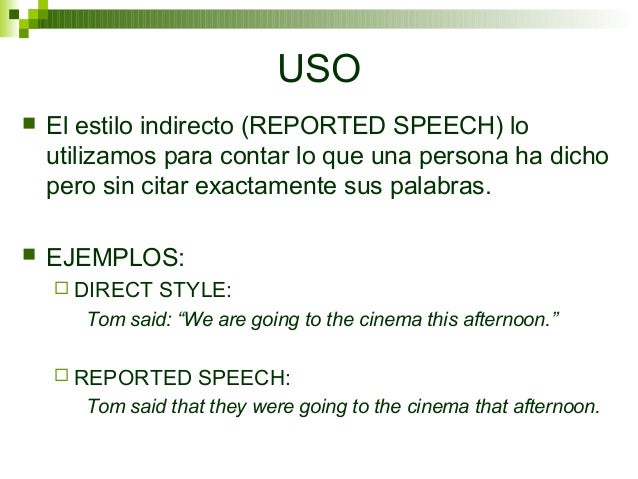REPORTED SPEECH
When we report someone’s words we can do it in two ways. We can use direct speech with quotation marks (“I work in a bank”), or we can use reported speech (He said he worked in a bank.)
In reported speech the tenses, word-order and pronouns may be different from those in the original sentence.
Present simple and present continuous tenses
- Direct speech: “I travel a lot in my job” Reported speech: He said that he travelled a lot in his job.
The present simple tense (I travel) usually changes to the past simple (he travelled) in reported speech.
- Direct speech: “Be quiet. The baby’s sleeping.” Reported speech: She told me to be quiet because the baby was sleeping.
The present continuous usually changes to the past continuous.
NB:
- “I work in Italy” Reported speech: He told me that he works in Italy.
It isn’t always necessary to change the tense. If something is still true now – he still works in Italy – we can use the present simple in the reported sentence.
Past simple and past continuous tenses
- Direct speech: “We lived in China for 5 years.” Reported speech: She told me they had lived in China for 5 years.
The past simple tense (we lived) usually changes to the past perfect (they had lived) in reported speech.
- Direct speech: “I was walking down the road when I saw the accident.” Reported speech: He told me he’d been walking down the road when he’d seen the accident.
The past continuous usually changes to the past perfect continuous.
Perfect tenses
- Direct speech: “They’ve always been very kind to me”. Reported speech: She said they’d always been very kind to her.
The present perfect tense (have always been) usually changes to the past perfect tense (had always been).
- Direct speech: “They had already eaten when I arrived” Reported speech: He said they’d already eaten when he’d arrived.
The past perfect tense does not change in reported speech.
You can find more information about reported speech in another section
Traduccion
 |
Cuando reportamos las palabras de alguien podemos hacerlo de dos maneras. Podemos usar el habla directa con comillas ("Yo trabajo en un banco"), o podemos usar el discurso reportado (Él dijo que trabajó en un banco.)
En el discurso informado, los tiempos verbales, el orden de las palabras y los pronombres pueden ser diferentes de los de la oración original.
Presentar tiempos continuos simples y presentesDiscurso directo: "Viajo mucho en mi trabajo" Discurso: Dijo que viajó mucho en su trabajo.El presente simple tiempo (yo viajo) por lo general cambia a la simple pasado (viajó) en el discurso informado.Discurso directo: "Quédate quieto. El bebé está durmiendo. "Discurso: Me dijo que estuviera callada porque el bebé estaba durmiendo.El presente continuo generalmente cambia al pasado continuo.NÓTESE BIEN:"Trabajo en Italia" Discurso: Me dijo que trabaja en Italia.No siempre es necesario cambiar el tiempo. Si algo todavía es cierto ahora - todavía trabaja en Italia - podemos utilizar el presente simple en la sentencia relatada.Pasados tiempos pasados simples y pasadosDiscurso directo: "Vivimos en China por 5 años". Discurso: Me dijo que habían vivido en China durante 5 años.El tiempo pasado simple (vivíamos) generalmente cambia al pasado perfecto (habían vivido) en el discurso reportado.Discurso directo: "Yo estaba caminando por la carretera cuando vi el accidente." Discurso: Me dijo que había estado caminando por la carretera cuando había visto el accidente.El pasado continuo generalmente cambia al pasado perfecto continuo.Tiempos perfectosDiscurso directo: "Siempre han sido muy amables conmigo". Discurso: Ella dijo que siempre fueron muy amables con ella.El tiempo perfecto presente (siempre ha sido) generalmente cambia al tiempo perfecto pasado (siempre lo había sido).Discurso directo: "Ya habían comido cuando llegué". Discurso: Dijo que ya habían comido cuando llegó.El tiempo pasado perfecto no cambia en el discurso reportado.Puede encontrar más información sobre el discurso reportado en otra sección.
EJEMPLOS

My uncle said that he was going to Florida. (Mi tío dijo que él iba a Florida)
My cousin said that he was too tired. (Mi primo dijo que él estaba muy cansado)
He said that he liked it very much. (Él dijo que le gustó mucho)
He asked me where I was going. (Él me preguntó a dónde iba)
My sister said that English is easy for her. (Mi hermana dijo que el inglés es fácil para ella)
She said that she wanted to kiss you. (Ella dijo que quería besarte)
They asked me how I was yesterday. (Ellos me preguntaron cómo estaba ayer)
He asked her if she liked his new car. (Él le preguntó a ella si le gustaba si nuevo automóvil)
She asked if I was going to eat in the cafeteria. (Ella me preguntó si iba a comer en la cafetería)
She told me that she couldn’t finish her homework. (Ella me dijo que ella no podría terminar su tarea)
She told her that she will never speak to him again. (Ella le dijo que ella no volverá a hablar con él nunca)
He told us that he could not go to the party with her. (Él nos dijo que él no podría ir a la fiesta con ella)
My boss told them that he was very busy. (Mi jefe les dijo que él estaba muy ocupado)
They told me that they could not attend the meeting. (Ellos me dijeron que no podrían asistir a la junta)
I asked him how much this cost. (Le pregunté cuánto cuesta esto) |


Comentarios
Publicar un comentario